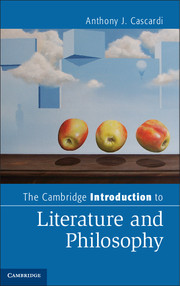Book contents
- Frontmatter
- Contents
- Acknowledgments
- Introduction
- Part I Questions of Truth and Knowledge
- Chapter 1 The “Ancient Quarrel”
- Chapter 2 Action, Imitations, Conventions of Make-Believe
- Chapter 3 The Single Observer Standpoint and Its Limits
- Chapter 4 Contingency, Irony, Edification: Changing the Conversation about Truth
- Part II Questions of Value
- Part III Questions of Form
- Afterword Limits
- Glossary of Keywords
- Notes
- Index
- References
Chapter 1 - The “Ancient Quarrel”
Published online by Cambridge University Press: 05 June 2014
- Frontmatter
- Contents
- Acknowledgments
- Introduction
- Part I Questions of Truth and Knowledge
- Chapter 1 The “Ancient Quarrel”
- Chapter 2 Action, Imitations, Conventions of Make-Believe
- Chapter 3 The Single Observer Standpoint and Its Limits
- Chapter 4 Contingency, Irony, Edification: Changing the Conversation about Truth
- Part II Questions of Value
- Part III Questions of Form
- Afterword Limits
- Glossary of Keywords
- Notes
- Index
- References
Summary
In one of the most famous passages of the Republic, Plato refers to the relations between literature and philosophy as reflecting an “ancient quarrel”:
[T]here is an old quarrel between philosophy and poetry. One can quote many examples of this ancient antagonism: remarks about the “bitch that growls and snarls at her master,” and “a reputation among empty-headed fools,” or “the crowd of heads that knows too much” and the “subtle thinkers” who are “beggars” nonetheless.
One of Plato’s aims in the Republic, we are led to understand, is to intervene in this ancient dispute in order to determine whether literature (“poetry” in Plato’s terms) can earn a rightful place in the ideal republic. To qualify for inclusion in the republic, literature will have to be judged to be both a source of truth and a conduit of virtue; at the very least, the proponents of literature will have to show that the poets are not the source of lies and do not encourage vices in the citizens of the state. In spite of the fact that Plato’s treatment of literature has sometimes been misconstrued, Plato’s answers to these questions have set the stage for much of the subsequent thinking about the relations between literature and philosophy in the Western tradition. This is especially so regarding what Plato has to say about literature’s relationship to the overarching concern of this section: truth. Ever since Plato, literature has been cast in a defensive position with respect to philosophical claims about the nature of truth. The recurrent complaints are that literature is bound to distort the truth about the real nature of things, or at best has nothing to do with truth at all – that it is a form of speech whose purpose lies elsewhere: in the cultivation of pleasure, or in the creation of beautiful things for their own sake, or in preserving memories from the past. To see what Plato may have been intending in addressing the ancient quarrel between literature and philosophy, and to grasp the larger significance of the terms he set in motion, it is necessary to understand something about Plato’s conception of the truth and to explain its relation to the preexisting tradition.
- Type
- Chapter
- Information
- The Cambridge Introduction to Literature and Philosophy , pp. 11 - 27Publisher: Cambridge University PressPrint publication year: 2014

